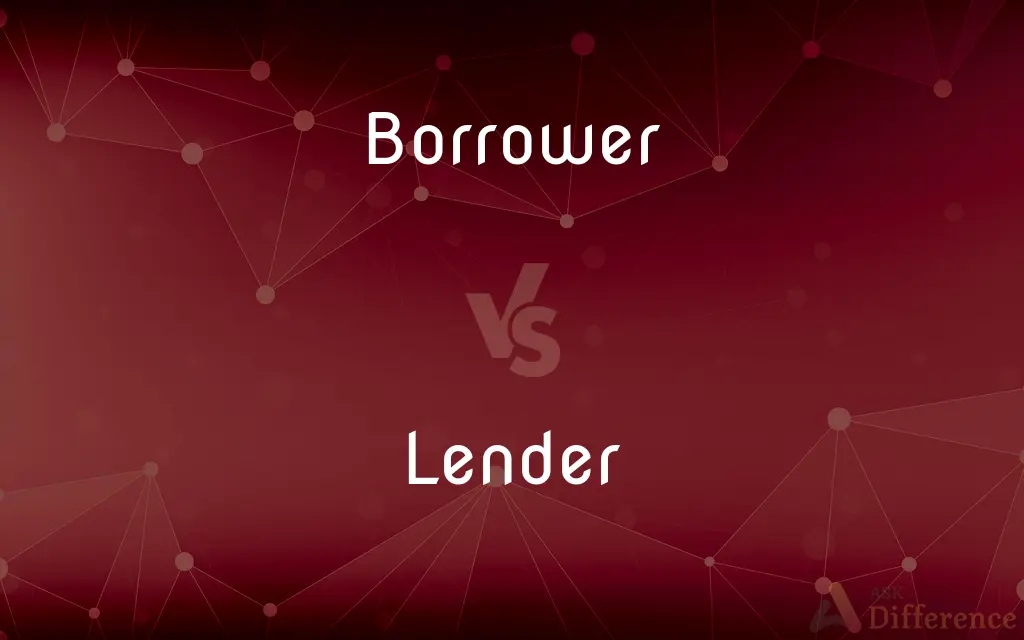Borrower vs. Lender — What's the Difference?
By Tayyaba Rehman — Updated on September 15, 2023
Borrower is someone who takes something on loan, typically money; Lender is the individual or institution that provides the loan.

Difference Between Borrower and Lender
Table of Contents
ADVERTISEMENT
Key Differences
A Borrower is the party that seeks to use or consume resources now with a promise to return equivalent resources later. The Lender, on the other hand, has the resources to spare and is willing to part with them in expectation of getting them back, often with interest.
The Borrower is responsible for fulfilling the terms of the loan, such as repayment and interest. The Lender, conversely, has the obligation to provide the loaned amount as agreed, and usually bears the risk of non-repayment.
While a Borrower's focus is often on the immediate need or opportunity, a Lender's focus tends to be on the return on investment. For the Borrower, the loan is a means to an end, such as buying a house; for the Lender, the loan itself is often the investment.
Creditworthiness is crucial for a Borrower to secure a loan. On the other side, the Lender must have enough capital or resources to provide the loan without compromising their own financial stability.
Legally, a Borrower enters into a contract that binds them to certain terms and responsibilities. The Lender, in contrast, stipulates the terms and usually retains the right to take legal action in case of default.
ADVERTISEMENT
Comparison Chart
Role
Receives the loan
Provides the loan
Focus
Immediate need or opportunity
Return on investment
Responsibility
Repayment, interest
Providing the loan, bearing risk
Legal Obligation
Bound to terms and responsibilities
Stipulates terms, may take legal action
Financial Aspect
Needs capital or resources
Must have sufficient capital to lend
Compare with Definitions
Borrower
An entity using credit facilities.
As a borrower, the company expanded its business operations.
Lender
A financial institution offering credit facilities.
The lender set the mortgage interest rate at 3%.
Borrower
A user of resources with an obligation to return them.
The borrower of the camping gear was responsible for its condition.
Lender
Someone who invests in loans as an asset class.
The lender considered loaning to small businesses a good investment.
Borrower
Someone in temporary possession of someone else's property.
The borrower was careful with the borrowed camera.
Lender
One that temporarily parts with money or property.
The lender was cautious about who they lent to.
Borrower
To obtain or receive (something) on loan with the promise or understanding of returning it or its equivalent.
Lender
An individual or entity that provides loans.
The lender approved my car loan.
Borrower
An individual who receives money or items on loan.
The borrower returned the book to the library.
Lender
To give or allow the use of temporarily on the condition that the same or its equivalent will be returned.
Borrower
To adopt or use as one's own
I borrowed your good idea.
Lender
To provide (money) temporarily on condition that the amount borrowed be returned, usually with an interest fee.
Borrower
In subtraction, to take a unit from the next larger denomination in the minuend so as to make a number larger than the number to be subtracted.
Lender
The source of funds in a financial agreement.
The federal government is a lender for student loans.
Borrower
(Linguistics) To adopt (a word) from one language for use in another.
Lender
To make available for another's use
The neighbors lent us help after the storm.
Borrower
To borrow something.
Lender
To contribute or impart
Books and a fireplace lent a feeling of warmth to the room.
Borrower
(Linguistics) To adopt words from one language for use in another.
Lender
To make a loan. See Usage Note at loan.
Borrower
One who borrows.
A library borrower's card
Lender
One who lends, especially money; specifically, a bank or other entity that specializes in granting loans.
Borrower
One who borrows.
Neither a borrower nor a lender be.
Lender
One who lends.
The borrower is servant to the lender.
Borrower
Someone who receives something on the promise to return it or its equivalent
Lender
Someone who lends money or gives credit in business matters
Borrower
A party in a financial contract agreeing to repay a sum of money.
The borrower made timely payments on the mortgage.
Common Curiosities
What does Borrower mean?
A Borrower is someone who receives a loan or borrows items from another party, the Lender.
Are Borrower and Lender mutually exclusive terms?
No, the same entity can act as both a Borrower and a Lender in different contexts.
What does Lender signify?
A Lender is the individual or institution that provides loans to a Borrower.
Can a Lender be a Borrower?
Yes, a Lender can become a Borrower, for instance, when a bank borrows from another financial institution.
Can a Lender be an institution?
Yes, Lenders can be individuals, financial institutions, or governments.
Are there laws that protect Borrowers and Lenders?
Yes, there are various laws that stipulate the rights and responsibilities of both Borrowers and Lenders.
Is creditworthiness important for a Borrower?
Yes, creditworthiness often determines a Borrower's ability to secure a loan from a Lender.
What is the role of interest in Lender-Borrower relationships?
Interest is the cost of borrowing and is how the Lender makes a return on the loan.
Can a Borrower negotiate terms with a Lender?
Yes, terms can often be negotiated depending on the Borrower's creditworthiness and the Lender's policies.
Can a Lender charge any interest rate they want?
No, interest rates are often regulated to protect both the Borrower and the Lender.
Can a Borrower also be a Lender?
Yes, a Borrower can also be a Lender in different financial transactions.
What risks does a Lender face?
A Lender risks the loss of their loaned money or items if the Borrower fails to repay.
What risks does a Borrower face?
A Borrower risks falling into debt and facing legal actions if they fail to repay the Lender.
Is a Borrower always an individual?
No, a Borrower can be an individual, a company, or even a government.
What happens if a Borrower defaults on a loan?
A default can lead to legal actions and loss of assets for the Borrower, while the Lender risks losing their loaned resources.
Share Your Discovery

Previous Comparison
Valence vs. Valance
Next Comparison
Intermittent vs. OccasionalAuthor Spotlight
Written by
Tayyaba RehmanTayyaba Rehman is a distinguished writer, currently serving as a primary contributor to askdifference.com. As a researcher in semantics and etymology, Tayyaba's passion for the complexity of languages and their distinctions has found a perfect home on the platform. Tayyaba delves into the intricacies of language, distinguishing between commonly confused words and phrases, thereby providing clarity for readers worldwide.















































